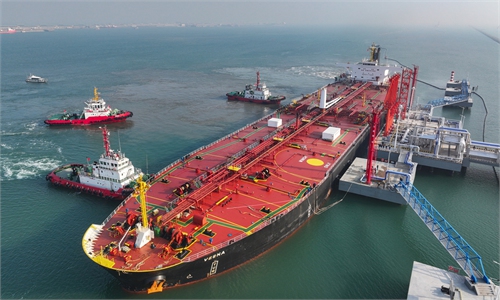International investors should not be misled by Moody's bungled research on China
International investors should use their own independent gauges


A view of the skyline of Beijing's CBD area Photo: VCG
Editor's Note: Following Moody's recent move to change China's credit outlook from stable to negative, China's Ministry of Finance has expressed deep disappointment and thought Moody's concerns about China's economic prospect and fiscal sustainability as unnecessary. The decision by Moody's may have some impact on international investors' sentiment about Chinese economy. Experts say that Moody's change on China's credit outlook still reflects the broad Western perspective, which has a limited understanding of China's comprehensive economic strength. They suggest that international investors maintain their independent gauge and analysis.
Xu Gao, the chief economist of BOC International (China) Co
Moody's still adopts a Western perspective when assessing China's economy, which hampers its comprehensive understanding of the Chinese economic landscape. The Moody's downgrade of China's credit outlook from stable to negative fails to accurately reflect the strong sustainability of China's debt, particularly its sovereign debt.
The size of a country's debt and the sustainability of its debt primarily depend on whether its domestic production capacity can surpass domestic demand. Simply put, an economy with production capacity exceeding domestic demand has a strong debt sustainability, while an economy with excessive domestic demand finds it difficult to sustain debt.
If domestic demand is excessive, it can lead to demand-driven inflation or trade deficits, which in turn can result in surging external debt. Whether it is escalating inflation or mounting external debt, both situations are ultimately unsustainable. The real limit on a country's debt lies in its inflation rate and international balance of payments.
China's production capacity surpasses domestic demand, which contributes to its robust debt sustainability. The country has low inflationary pressure and maintains a healthy long-term balance of international payments, leading to a substantial accumulation of net foreign assets. Without a doubt, China's debt sustainability is exceptionally strong.
The use of inflexible analysis methods by Western rating agencies assessing China's economy may still persist. China's exceptional production capacity, which is uncommon in the Western world, might not be fully comprehended by the rating agencies, leading to a limited understanding of the actual constraints on China's debt. This can be interpreted as a deficiency in their macro perspective on China.
In addition to strong debt sustainability, China also has ample room for policy maneuvering. The Chinese government has a strong ability to stabilize economic growth. China still has the potential to maintain stable growth, so foreign investors should remain confident in China's economic prospects.
The upgrading of China's economic and industrial structure on the supply side has been rapidly advancing, with new driving forces constantly emerging. Western rating agencies should pay more attention to China's new driving forces and economic transformation. For example, in the past three years, China's automobile industry achieved a historic breakthrough with the help of the transformation toward new energy.
Indeed, the traditional growth engine of the real estate sector has undergone adjustments lately, and significant challenges have emerged. However, with the implementation of the government's support policies, it is believed that the real estate market can regain its momentum and recover gradually.
Dong Shaopeng, a senior research fellow at the Chongyang Institute for Financial Studies at the Renmin University of China
The Moody's rating system has inherent limitations and is not entirely objective. The decision to downgrade China's credit outlook to negative is primarily based on an analysis of the current data. It is not unexpected that the agency cut China's credit outlook due to the country's rising debt levels and slower economic growth. It is undeniable that Moody's assessment of Chinese state-owned enterprises has long been biased politically.
The debt ratio and liability ratio of both the central and local governments in China are generally manageable. In response to Moody's downgrade, the Chinese Ministry of Finance stated on Tuesday that fiscal revenue has been recovering in line with the improving economic situation. Moody's concerns about China's economic growth prospects and fiscal sustainability are unnecessary.
Moreover, China's social system has obvious advantages, which can increase coordination efforts to resolve severe imbalances in debt and investment. In particular, China has great domestic demand potential, a strong manufacturing support system, and robust endogenous development momentum, which effectively offset the impact of adjustments in the real estate market.
The adjustment in the real estate market did not happen suddenly, nor was it completely unexpected. Measures to address the challenge have also been prepared. In recent years, there has been a continuous push for technological innovation and the accelerated development of green and low-carbon industries, as well as the rapid growth of industries such as new-energy vehicles. Moody's concerns about China's fiscal situation are understandable, but the agency should also study the progress of China's industrial transformation more closely.
As a major rating agency in the Western world, Moody's primarily has an impact on the sentiment of foreign investors.
However, international investors should recognize that Moody's analysis lacks dynamic research and a deep understanding of China's governance model, thus making the mistake of clinging to outdated views.
International investors' confidence in the prospects of the Chinese economy stems not only from the current data, which reflect stable growth, but also from the emergence of new economic drivers in China.
More importantly, the development model and path of the Chinese economy have proven successful in promoting continuous and stable economic growth, unaffected by external attempts to undermine or belittle it. At a time when the global economy faces significant challenges following the recovery from the Covid pandemic, China's stable economic growth not only contributes to the stability of the world economy but also serves as a model that other countries can learn from.



